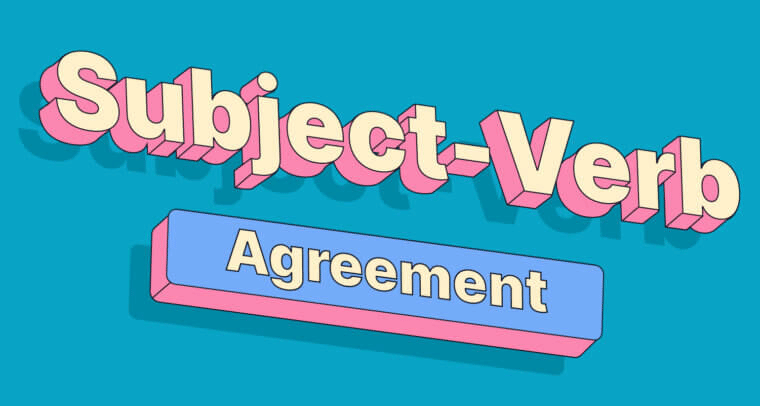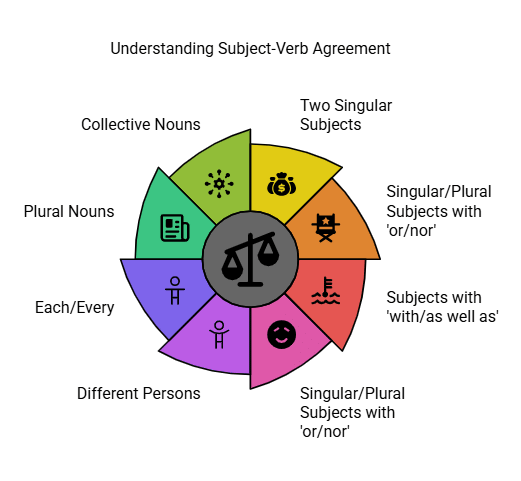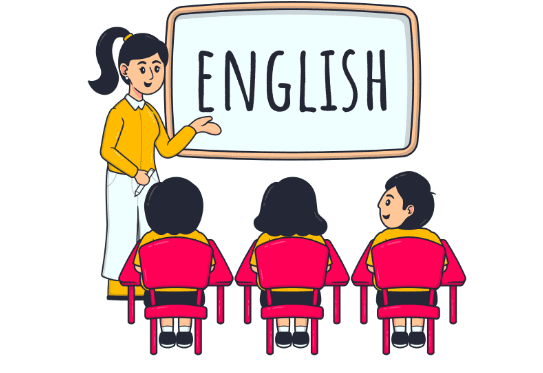Subject Verb Agreement | English Grammar for Class 6 PDF Download
Subject-Verb Agreement means that the subject and verb in a sentence must match in both number (singular or plural) and person (first, second, or third).

1. Singular Subject and Singular Verb
If the subject is singular (one person or thing), the verb must also be singular.
Examples: My bag is very heavy.
Singular Subject: My bag
Singular Verb: is very heavy.
2. Plural Subject and Plural Verb
If the subject is plural (more than one person or thing), the verb must be plural.
Examples: Boys play cricket.
Plural Subject: Boys
Plural Verb: play cricket.
Examples: We are reading books.
Plural Subject: We
Plural Verb: are reading books.
3. Matching Person
The verb should match the subject in terms of person. Here’s a simple way to remember it:
First Person: I (singular) or We (plural)
Examples:
- I am happy.
- We are happy.
Second Person: You (singular/plural)
Examples:
- You are my friend.
- You are my friends.
Third Person: He, She, It (singular) or They (plural)
Examples:
- He runs fast.
- They run fast.

Subject-Verb Agreement with Various Cases
Understanding subject-verb agreement can be tricky, especially when dealing with different kinds of subjects and their relationships. Here's a simple guide to help you understand these rules with examples:

1. Two Singular Subjects Joined by 'and'
When you have two singular subjects joined by "and," you use a plural verb because the combined subjects create a plural idea.
Examples:
- Gold and silver are precious metals.
Gold + Silver = Plural - Fire and water do not agree.
Fire + Water = Plural
2. Two Singular Subjects Joined by 'or' or 'nor'
When subjects are joined by "or" or "nor," the verb should match the subject closest to it.
Examples:
- Neither food nor water was to be found there.
Water is singular, so the verb is singular. - Neither the chairman nor the directors are present.
Directors is plural, so the verb is plural.
3. Subjects Joined by 'with' or 'as well as'
When "with" or "as well as" joins subjects, the verb should agree with the first subject.
Examples:
- Silver as well as cotton has fallen in price.
Silver is the first subject, so the verb is singular. - The ship with its crew was lost.
Ship is the first subject, so the verb is singular.
4. Two or More Singular Subjects Connected by 'or' or 'nor'
When two or more singular subjects are joined by "or" or "nor," they take a singular verb.
Examples:
- Our happiness or sorrow is largely due to our own actions.
Happiness or sorrow is singular, so the verb is singular.
5. One Singular and One Plural Subject Joined by 'or' or 'nor'
When one subject is singular and the other is plural, the verb should agree with the plural subject, and the plural subject should be nearest to the verb.
Examples:
- Neither the chairman nor the directors are present.
Directors is plural, so the verb is plural.

6. Subjects of Different Persons Joined by 'or' or 'nor'
When subjects of different persons are joined by "or" or "nor," the verb agrees with the nearest subject.
Examples:
- Either he or I am mistaken.
I is the nearest subject, so the verb is singular. - Neither you nor he is to blame.
He is the nearest subject, so the verb is singular.
7. Each, Every, Many a
Words like "each," "every," and "many a" are followed by a singular verb, even though they might refer to more than one item.
Examples:
- Each of these substances is found in India.
Each is singular, so the verb is singular. - Everyone of the boys loves to ride.
Everyone is singular, so the verb is singular. - Many a man does not know his own good deeds.
Many a is singular, so the verb is singular.
8. Nouns Plural in Form but Singular in Meaning
Some nouns are plural in form but singular in meaning, and they take a singular verb.
Examples:
- The news is true.
News is singular. - Mathematics is an important subject.
Mathematics is singular. - The first innings is over.
Innings is singular here.
9. Plural Nouns with Specific Quantities or Amounts
When a plural noun represents a specific quantity or amount considered as a whole, it takes a singular verb.
Examples:
- Ten kilometres is a long walk.
Ten kilometres is treated as a singular unit. - Fifty thousand rupees is a large sum of money.
Fifty thousand rupees is treated as a singular unit.
10. Collective Nouns
Collective nouns can take singular or plural verbs depending on whether the group is seen as a single unit or as individual members.
Examples:
- The committee has issued its report.
Committee is seen as a single unit, so the verb is singular. - The jury are divided in their opinions.
Jury members have different opinions, so the verb is plural.
|
49 videos|349 docs|46 tests
|
FAQs on Subject Verb Agreement - English Grammar for Class 6
| 1. What is subject-verb agreement? |  |
| 2. Why is subject-verb agreement important in writing? |  |
| 3. What are some common examples of subject-verb agreement errors? |  |
| 4. How can I improve my subject-verb agreement skills? |  |
| 5. Are there any exceptions to subject-verb agreement rules? |  |





















